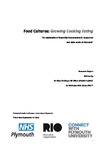Food Cultures: Growing Cooking Eating - An exploration of improving food practices in young men and older adults in Plymouth
| dc.contributor.author | Pettinger, Clare | |
| dc.contributor.author | Whitelaw, E | |
| dc.contributor.other | Department of Health (SW); NHS; Real Ideas Organisation (RIO) | |
| dc.date.accessioned | 2016-12-15T07:01:51Z | |
| dc.date.available | 2016-12-15T07:01:51Z | |
| dc.date.issued | 2012 | |
| dc.identifier.uri | http://hdl.handle.net/10026.1/8125 | |
| dc.description.abstract |
Executive summary This project explored how food projects can influence food related skills and promote behaviour change in young men and older adults in Plymouth. Young men are known to have a low intake of fruit and vegetables (NDNS 2011) and many older people are vulnerable to poor nutrition (CWT 2004); currently there are relatively few food intervention projects targeting these two groups. In 2010 eight food projects in Plymouth were funded to take part in the ‘Food Cultures Project’, an innovative partnership between agencies and civic organisations from the public health, social care, youth and social enterprise sectors. An evaluative research framework was also developed to measure outcomes. This report outlines the methods and findings of this work and concludes by considering the implications and recommendations for further development. This report also explores the productive aspects of such “new partnership” working between health and higher education institutions and the growing social enterprise sector. A mixed methods approach was used: firstly a quantitative survey was designed for assessing, at baseline and endpoint, outcomes common to each project: i) food growing confidence and skills, ii) cooking confidence and skills and iii) eating practices (fruit and vegetable, cooking ‘from scratch’). Secondly, an endpoint qualitative survey captured the feelings and experiences emerging from the project participants. This report considers the combined findings of all eight projects, and also focuses in more detail on case studies of two of the projects. In summary, the participants (n=42) reported increases in all food growing activities, and a notable 36% decrease in ‘not doing any growing at all’. There was an increase (10%) in meals cooked ‘from scratch’ alongside a 34% decrease in convenience food consumption. Confidence in growing and cooking activities increased for all participants. There was an increase in the consumption of fruit (0.31) and vegetable (0.3) portions. Skills gained from participation included chopping vegetables, cooking, healthy eating, and team-working. Change was reported for healthy eating awareness and social connections. Generally, participants boosted their self-esteem. Participants enjoyed the ‘social health’ approach, e.g. going on trips out and activities which encouraged social interaction. There was no doubt that this innovative approach worked particularly well for the younger groups - there was evidence of improved personal growth (health, confidence, motivation, skills) and community development (teamwork, social connections and engagement). The older groups demonstrated similar trends, although social engagement was less apparent in the findings, suggesting a need to develop more appropriately tailored approaches for some older population groups. | |
| dc.language.iso | en | |
| dc.relation.ispartof | Food Cultures: Growing Cooking Eating - An exploration of improving food practices in young men and older adults in Plymouth | |
| dc.subject | Food projects | |
| dc.subject | Growing | |
| dc.subject | Cooking | |
| dc.subject | Eating | |
| dc.subject | evaluation | |
| dc.subject | older adults | |
| dc.subject | younger adults | |
| dc.title | Food Cultures: Growing Cooking Eating - An exploration of improving food practices in young men and older adults in Plymouth | |
| dc.type | report | |
| plymouth.author-url | http://www.foodplymouth.org/wordpress/wp-content/uploads/2013/01/Food-Cultures-FINAL.pdf | |
| plymouth.confidential | false | |
| plymouth.publication-status | Unpublished | |
| plymouth.organisational-group | /Plymouth | |
| plymouth.organisational-group | /Plymouth/Faculty of Health | |
| plymouth.organisational-group | /Plymouth/REF 2021 Researchers by UoA | |
| plymouth.organisational-group | /Plymouth/REF 2021 Researchers by UoA/UoA03 Allied Health Professions, Dentistry, Nursing and Pharmacy | |
| plymouth.organisational-group | /Plymouth/Research Groups | |
| plymouth.organisational-group | /Plymouth/Research Groups/Institute of Health and Community | |
| plymouth.organisational-group | /Plymouth/Users by role | |
| plymouth.organisational-group | /Plymouth/Users by role/Academics | |
| dc.publisher.place | Plymouth | |
| dc.rights.embargoperiod | Not known | |
| rioxxterms.licenseref.uri | http://www.rioxx.net/licenses/all-rights-reserved | |
| rioxxterms.type | Technical Report |


